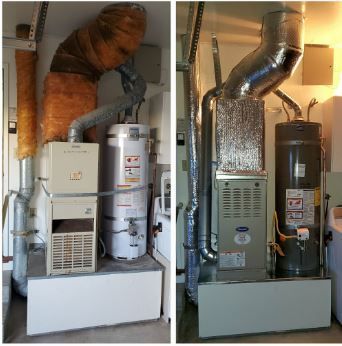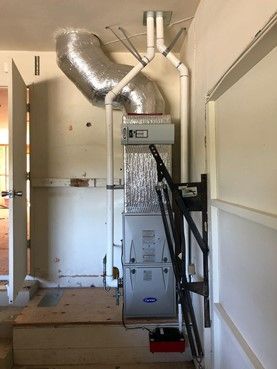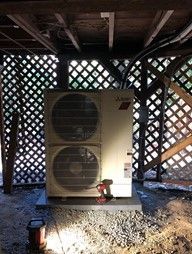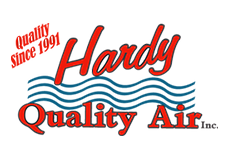Residential Heating & Air

At Hardy Quality Air, INC, we are committed to making your home environment comfortable to your particular needs. Therefore, we will not just sell you a furnace to sell you a furnace. We will not provide you with any old air conditioning systems or push unnecessary repairs on you.
We believe in always doing things the right way and earning your long-term trust. Though we work on all makes and models, we are proud to say we are an authorized Carrier dealer. We believe in their products and stand behind our work. Back in 1902, Willis Carrier invented the air conditioner, and his company is considered one of the premiere manufacturers of HVAC equipment in the country. In 1994, Carrier was one of the first HVAC companies to phase out the use of refrigerants that were eating away the ozone layer. It has taken other steps to reduce its operations’ impact on the environment and make its products more environmentally friendly. When we send our technicians to your home, they ask these questions: Is your system working as you need it to? Are there hot and cold spots? Do you have any indoor air quality concerns? We will then provide a customized solution that is just right for you and your budget.
All of our technicians are highly trained and enjoy their profession. They arrive ready to answer questions and solve any problems you may have. When you choose our company to help with your home systems, you can be confident you are receiving the best, most honest service from a locally owned and operated family business.
Considering Converting to Electric Heating?
We offer a broad range of Heat Pump options, including Ductless, Ducted, and Hybrid Heating systems.
Below are some statements about heat pumps that we hope will aid you in your decision-making process regarding indoor comfort and energy use.
Please feel free to contact us with any questions or if you would like for us to survey your home or office so we can offer the best solutions for your specific needs.

Heat Pumps and Hybrid Heating Explained
In very basic terms, a heat pump is an Air Conditioner that can operate backward to extract heat from the outside and put it into the home or commercial building. Therefore, if you install a heat Pump, you also get the benefit of air conditioning.
While temperatures in this area of the country are pretty moderate, they do dip into the low 30s and even high 20s on occasion.
Standard Heat Pumps lose heating capacity as outdoor temperatures drop below 40 Degrees and really lose effectiveness at temperatures below 35 Degrees (depending on the model) when you need the heat the most. We can compensate for that by adding what's called Auxiliary strip heaters. However, these devices are very energy inefficient and require a lot of additional Amperage (power), including a separate electrical circuit of between 30 and sometimes even 100 Amps or more, depending on what size is required for the home or other building heating needs. These also act as backup (Auxiliary Heat) should the Heat Pump fail.
These Auxiliary heaters also compensate for what's called "defrost cycles." The Heat Pump's outdoor coil will ice up until it is literally frozen solid if it is not occasionally defrosted, restricting airflow through the unit, which would eventually render it completely ineffective. To achieve this defrost cycle, the machine actually turns to air conditioning mode to heat the outdoor coil and thaw the unit out. The colder it is outside and the more moisture there is in the air, the more frequently these defrost cycles happen; hence, this is the primary reason for the loss of heating capacity. This can and usually does have an impact on indoor comfort since the unit typically spends less time actually heating the building during times when you need the heat the most.
Straight Heat Pump systems (100% electric heat) incorporate a "Fan Coil" to circulate the air throughout the home instead of a furnace. When swapping these appliances, one must consider that the furnace only requires 115 Volts, whereas most Fan Coils require 230 Volts. In many cases, the power supply for the Fan Coil becomes an issue and an added expense. Some Manufacturers are beginning to address this with 115-volt models, but the selection is limited at this time.
The biggest issue with many homes is the limited heating capacity of Residential Heat Pumps. Many homes over 1,500 sq. feet, especially those of older construction, will require more BTUs than the largest residential heat pump can provide during those colder days, leaving you uncomfortable when you need it the most.
The largest Heat Pump and A/C unit for residential applications is around 60,000 B.T.U.'s (AKA 5 Tons), which again can be a problem for larger homes where an 80,000, 100,000, or even larger heating capacity is needed to keep the home warm. The hybrid heat systems can accommodate the higher heating requirements when needed.
A Hybrid Heating system, sometimes referred to as a "Dual Fuel" system, incorporates a Heat Pump that allows you to use electricity to efficiently heat the home between 70% and 95% of the time (depending on the model, the efficiency of the home and outdoor temperatures), instead of burning propane or natural gas, until the outdoor temperatures drop too low for the Heat Pump to be as effective. Once that happens, the heat pump stops, and the gas furnace takes over, ensuring adequate heating capacity when you need it the most.
Dual Fuel also offers redundancy convenience. If the Heat Pump goes down, you still have the furnace.
If you are considering a backup power Generator, the gas furnace will typically have no problem operating since the unit only requires a 115-volt, 15-volt, or 20-volt circuit (operating Amps are typically in the 9- to 14-amp range). In contrast, Heat pumps (or Air Conditioners) require a 230-volt circuit and between 30 and 60 Amps, depending on the size and model.
MOST A/C or Heat Pump units will struggle to start when powered by a generator unless the unit’s compressor has what's called Inverter Technology. Depending on the Brand, this feature is only available in more expensive models, such as Carrier's Infinity line, one of the most energy-efficient models Manufactured today.
If appropriately sized, furnaces can often function on backup battery systems with Inverters, most of which are fed by solar panels. Consult with your Solar Designer and Generator provider about limitations, and in the discussion, include other potentially large critical electrical loads like well pumps, refrigerators, freezers, and lighting before assuming that all will work fine together with your alternative energy systems. These are typically the 4- primary concerns and goals of backup power systems.
We proudly offer the Hybrid Heat feature with every heat pump installation (with the exception of Ductless/mini Split systems) as a solid solution to the long inherent shortcomings of standard Heat Pumps, provided there is a gas supply to the home already and especially if you already have a forced air furnace.
If you are considering adding A/C and have or plan to add a solar array and already have gas, this hybrid design can be a perfect long-term win-win for your home or other building.
If you live within 3- Miles of the Coast, you should seriously consider adding a Coastal Corrosion Coating to your Air Conditioner or Heat pump to help protect your investment from the corrosive effects of the Ocean since these units must be installed outdoors.

Ductless Heat Pumps
Ductless heating (also known as mini splits), a Ductless Heat Pump, is a type of heating and cooling system that doesn't require any ductwork. It moves heating and cooling energy through refrigerant, which makes these systems some of the most energy-efficient systems on the market today. The system has an outdoor compressor unit that's connected to one or multiple indoor units of various types, from wall-mounted, floor-mounted, ceiling-mounted, ceiling recessed to even ducted systems.
Hi-Velocity Systems
The Hi-Velocity System is an energy-efficient air delivery system that can provide heating, cooling, filtration, ventilation, humidification, and dehumidification.
The Hi-Velocity SDHV (Small Duct High Velocity) System works on the principle of pressure rather than air velocity, allowing much smaller ducts to provide the same amount of Heating and Cooling energy to the space. These systems can be coupled with a boiler for Hydronic Heating, an Air Conditioner for Cooling, or a Heat Pump.






